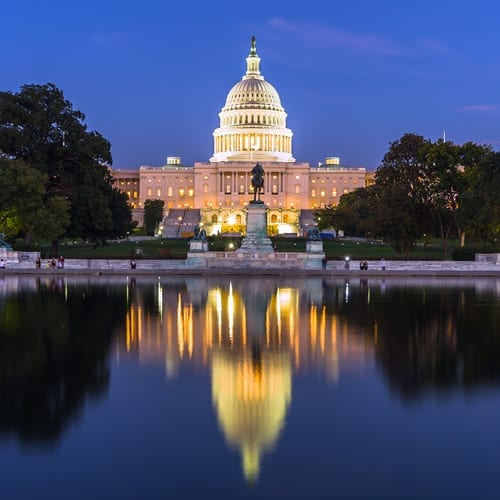
A House subcommittee hosted a significant hearing Wednesday to discuss why cannabis prohibition should end in America, focusing on racial justice.
The House Judiciary Subcommittee on Crime, Terrorism, and Homeland Security hearing, titled “Marijuana Laws in America: Racial Justice and the Need for Reform,” was held against a backdrop of rising passage and consideration of statewide legalization. Just last month, Illinois lawmakers voted to legalize and regulate adult-use sales of cannabis, bringing the number of states to eleven (plus D.C.). And if New York and New Jersey lawmakers didn’t struggle to agree over equity and social justice provisions, that number would have been greater.
Just as the debate in these states became less about whether to legalize than about how to legalize, so too did the congressional hearing. Still, the broad focus among witnesses was to urge Congress to federally legalize cannabis in order to “repair the harm” done to the communities most affected by the war on drugs.
“I refuse to be complicit in the continued decimation of poor black and brown communities, where we as a community irresponsibly continue to maintain—and unfathomably seek to justify and defend—a set of policies that without question are racist,” said one witness at the hearing, Marilyn Mosby, state’s attorney for Baltimore, who announced in January that her office will stop prosecuting cannabis possession, and vacate close to 5,000 possession convictions.
Nationally, despite similar cannabis use rates, black consumers are nearly four times as likely to be arrested for a cannabis related crimes, according to the American Civil Liberties Union. More than 650,000 people were arrested for cannabis-related crimes in 2017, according to the FBI. Of these, close to 91 percent were for cannabis possession.
Racial differences in cannabis prosecution, and the results of that discrepancy, was the steady theme of the hearing. “The state of cannabis policy today is best described as a tale of two Americas. In one America there are men and women, most of them wealthy, white, and well-connected, who are starting cannabis companies, creating jobs, amassing significant personal wealth, and generating billions in tax dollars” said Dr. Malik Burnett, resident physician at the Johns Hopkins Bloomberg School of Public Health. “In the other America, there are men and women, most of them poor people of color, who are arrested for cannabis and suffer the collateral consequences associated with criminal convictions.”
Cannabis convictions have a far-reaching ripple effect that can prevent people from acquiring federal loans and housing, employment, healthcare, and more, said Mosby. Burnett suggested that Congress legalize cannabis and use the tax generated from the industry to fund programs for record sealing, expungement, job training, improving public schools infrastructure, and medical and public health research—particularly for communities disproportionately impacted by the war on drugs.
“Focusing legislative efforts to create incentives to ensure that the economic potential of this industry is shared across communities, and that the employment places are comprised of a diverse set of workers, is a worthwhile goal and well within reach at the federal level,” Burnett said.
Legalizing cannabis will also give the cannabis industry, and small cannabis businesses in particular, access to much-needed financial services, witnesses said at the hearing. The inability to acquire affordable start-up capital is a major factor keeping members of minority groups out of the industry, Burnett said.
Neal Levine, CEO of the Cannabis Trade Federation, said that while the federation supports this more sweeping vision for cannabis legalization, the STATES Act—which would not federally legalize cannabis but would protect cannabis businesses that are in compliance with state cannabis laws from federal prosecution—could be used as an intermediate measure to resolve conflicts between federal and state cannabis laws. For example, cannabis businesses usually pay much higher taxes than other businesses, as they are not allowed traditional deductions or tax credits under federal law.
Mosby, however, strongly opposed the STATES Act, because it does not directly address racial and social justice for communities disproportionately affected by enforcement of drug laws.
Burnett also highlighted the struggles immigrants face because of cannabis prohibition. Holding a job in the industry makes them and every non-citizen in their family ineligible for naturalization, he said. Similarly, legal permanent residents who’ve used cannabis medically or recreationally could be indefinitely detained or deported when returning to the United States after traveling abroad.
“The damage associated with breaking up immigrant families has been on full display in America as of late,” Burnett said. “Congress should not allow the legal use of cannabis or efforts to acquire gainful employment in the cannabis industry to contribute to this fundamentally un-American activity.”
Rep. Hakeem Jeffries, among others, noted the racist roots of cannabis prohibition, referring to Harry Anslinger, the architect of reefer madness, who targeted minorities as “miscreants,” the primary users of cannabis. “The war on drugs has been a failure. It’s been a stain on our society, our democracy, our country,” Hakeem said. “It’s time to end it. We can begin by dealing with marijuana decriminalization.”
Rep. Tom McClintock, a Republican from California, while supportive of decriminalization, took issue with racial justice aspect of the hearing.
“I do regret that just as strong bipartisan support is emerging on this issue, the majority has decided to play the race card at today’s hearing. We should have only one race in our free country—the American race,” McClintock said, “And the left does it enormous harm every time it tries to divide Americans along racial lines. The fact is that our marijuana laws have badly served all of us as a nation and this realization could be used to bring us together rather than tear us apart.”
In response, House Committee on the Judiciary chair Jerry Nadler said, “Enforcement of marijuana laws has been done in a racially disparate manner. The effects have been racially disparate. To point that out and to seek to cure that is not to inflame racial divisions. It’s simply to point out a fact of life and try to cure it.”
Source: CannabisWire.com





